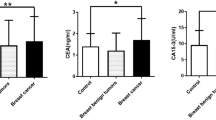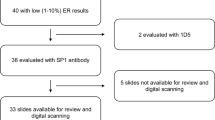Abstract
A novel quantitative luminometric immunoassay (LIA) has been developed for the measurement of wild-type and mutant p53 protein in extracts from breast tumour tissue. The LIA was found to yield reliable estimates of p53 expression in cytosol samples routinely prepared for steroid receptor analysis as compared with results obtained with immunohistochemical analysis. The LIA was evaluated on 205 primary breast tumour cytosols prepared for steroid receptor analysis and stored frozen at -80 degrees C for 6-8 years, p53 protein being detected in 65% of the samples (range 0.01-23 ng mg-1 protein). Using an arbitrary cut-off value of 0.15 ng mg-1 protein, 30% of the tumours were classified as manifesting p53 overexpression. Significant and independent correlations were found to exist between p53 overexpression and shorter disease-free (P < 0.001) and overall survival (P = 0.039) at a median duration of follow-up of 50 months. p53 overexpression was related to low oestrogen receptor content and high proliferation rate (S-phase fraction). No relationship was found to tumour size or the presence of lymph node metastasis. Three tumours possessed an extremely high p53 content (> 10 ng mg-1 protein), all of which were of medullary or high-grade ductal type, oestrogen and progesterone receptor negative, DNA non-diploid, had S-phase fractions of > 22% and recurred within 1-2 years. In summary, a new sensitive and quantitative LIA suitable for routine analysis of p53 protein in steroid receptor cytosol preparations from breast tumours has been developed to confirm the prognostic importance of p53 protein accumulation in human breast cancer.
This is a preview of subscription content, access via your institution
Access options
Subscribe to this journal
Receive 24 print issues and online access
$259.00 per year
only $10.79 per issue
Buy this article
- Purchase on Springer Link
- Instant access to full article PDF
Prices may be subject to local taxes which are calculated during checkout
Similar content being viewed by others
Author information
Authors and Affiliations
Rights and permissions
About this article
Cite this article
Borg, A., Lennerstrand, J., Stenmark-Askmalm, M. et al. Prognostic significance of p53 overexpression in primary breast cancer; a novel luminometric immunoassay applicable on steroid receptor cytosols. Br J Cancer 71, 1013–1017 (1995). https://doi.org/10.1038/bjc.1995.195
Issue Date:
DOI: https://doi.org/10.1038/bjc.1995.195
This article is cited by
-
Higher plasma vascular endothelial growth factor levels correlate with menopause, overexpression of p53, and recurrence of breast cancer
Breast Cancer (2003)
-
Prognostic value of uPA and p53 accumulation measured by quantitative biochemical assays in 1245 primary breast cancer patients: a multicentre study
British Journal of Cancer (1999)
-
Prognostic significance of bcl-2 expression in leiomyosarcoma of the uterus
British Journal of Cancer (1999)
-
Enhanced prediction of breast cancer prognosis by evaluating expression of p53 and prostate-specific antigen in combination
British Journal of Cancer (1999)
-
Expression of high p53 levels in colorectal cancer: a favourable prognostic factor
British Journal of Cancer (1999)



